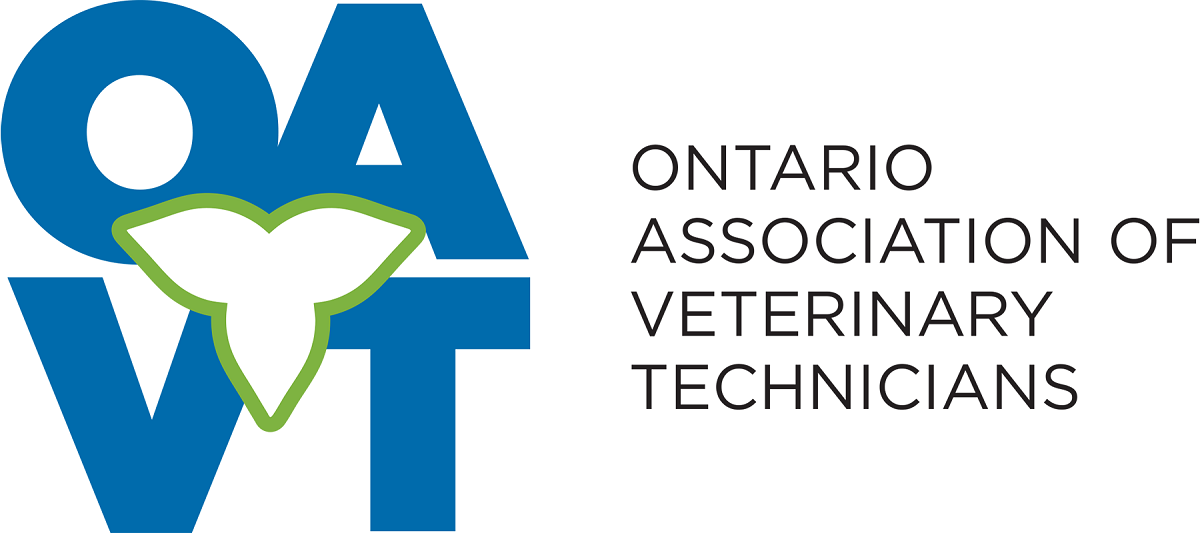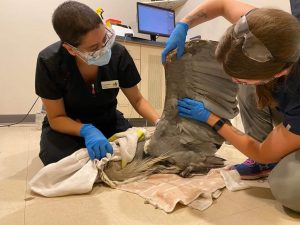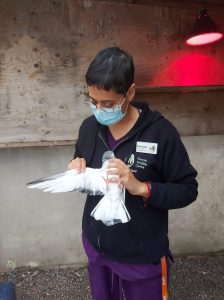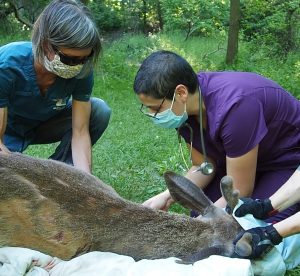Naschelly Kyssa, HBSc., RVT
Where did you go to school and what made you decide to take a Veterinary Technician program?
I attended Algonquin College in Ottawa after completing my undergraduate program (in Environmental Sciences specializing in Biodiversity Conservation) at the University of Ottawa. I wanted to pursue a more hands-on and practical approach to my knowledge and skill set in order to achieve my goals of one day working in a field relating to wildlife conservation.
What is your current job(s)? When did you start it? What are your primary responsibilities?
I currently work as an RVT and senior rehabilitator at the Toronto Wildlife Centre (TWC). I was hired on as staff over 4 years ago after starting out as a volunteer. I am also working as a part time professor at Sheridan College teaching in the veterinary technician and animal care programs.
Just as in a regular clinic my role as an RVT at TWC involves radiology, surgical assistance, anesthesia, hospital maintenance, patient assessments, medical treatments, diagnostics, education through the training of students/interns/volunteers, and most importantly being an advocate for our patients. Here, that looks a bit different since our patients do not have owners, so instead we are also heavily trained in our rehabilitation department to best understand the natural history and thus husbandry needs of our wild patients. That way we can ensure the medical team can provide the best care to these animals without causing added stress or handling. Working with wildlife is very different from domestic animals, they see us as predators and so we work hard to make sure we can reduce their stress as much as possible.
This past winter semester I began my job at Sheridan College. I am lucky that my work at TWC compliments some of my courses at Sheridan as currently my main courses involve teaching exotic animal medicine.
What do you love about your current job?
My current jobs fulfill my passion of being able to make a difference in the lives of animals who have no voices. I’ve always had a stewardship outlook on the world and thus being able to help a wild animal heal from what are usually human related injuries is what I love most about my job. I also feel so privileged to be able to give back to the future generations through being able to mentor and teach at both TWC and Sheridan. The field of wildlife (or even exotic) medicine is very unique, specialized, and small. Thus, being able to share my knowledge and hopefully spark the interest of students is very inspirational for me.
What other jobs have you had in the RVT field?
I was lucky to have done my final semester placement rotation at TWC and from there quickly made plans to continue to volunteer at the centre until a position opened up. During that time, I also worked as an RVT in a small animal practice.
What or who has had a significant impact on your career as an RVT?
The professors at my technician program really helped to push me into following the unique career path I wanted. I owe a lot to their passion for teaching and to their mentorship. Now being able to teach students myself at both my jobs brings me great joy. I hope to also inspire and mentor new wildlife or exotic animal technicians.
If you could encourage other RVTs to focus on ONE thing to improve their skills, or overall wellbeing, what would it be?
Understand your needs and boundaries. Often in this field we are constantly giving many aspects of ourselves; our time, our skills and knowledge, our emotions and hearts. It is important to self-reflect and know when we need a break. We cannot continually give if we are not nurturing and taking care of ourselves first.
RVTs are passionate people, and every RVT has an area they are most passionate about (nutrition, research, spay/neuter, dog bite prevention, education, etc.) What is your passion? Does your current job allow you to fulfill your passion?
My passion involves sharing my love for the field of wildlife medicine with others through education. I am able to fulfill this passion at both my jobs. At TWC, we take on many veterinary and veterinary technician students yearly for their placement or rotations. While at Sheridan I get to help be a resource for those who are interested in a different path from regular small animal medicine.



